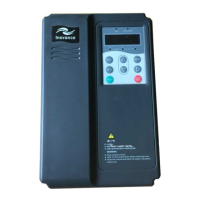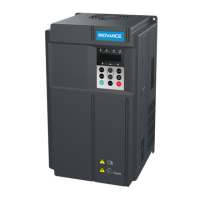RTU frame format
START
Frame Start
3.5-character time
Slave addr. Communication addr. : 1 to 247
Command Code 03:Read slave parameters 06: Write slave parameters
DATA
(
N-1
)
Data
:
Function code paameter address, the number of function
code parameter, Function code parameter,etc.
DATA
(
N-2
)
……
DATA0
F.4 Protocol description
C320 series inverter communication protocol is a kind of serial master-slave communication
protocol, in the network, only one equipment, and master can build a protocol, (Named as
“Inquire/Command”). Otherequipments, slave’s response “Inquire/Command” of master only
by providing the data or doing the action according to the master’s “Inquiry/Command”. Here,
master is Personnel Computer, Industrial Machine or Programmable logical controller, and the
slave is inverter. Master not only visits some slave, but also sends the broadcast information
to all the slaves. For the single master “Inquiry/Command”, all of slaves will return a signal that
is a response; for the broadcast information provided by master, slave needs not feedback a
response to master machine.
F.5 Communication data structure
ModBus protocol communication data format of MD320 series of inverter is shown as following:
(
In RTU mode, messages start with a interval of at least 3.5 character times. This is most easily
implemented as a multiple of character times at the baud rate that is being used on the network
(shown as T1-T2-T3-T4 in the figure below). The first field then transmitted is the device
address.The allowable characters transmitted for all fields are hexadecimal 0 ... 9, A ... F.
Networked devices monitor the network bus continuously, including during the silent intervals.
When the rst eld (the address eld) is received, each device decodes it to nd out if it is the
addressed device. Following the last transmitted character, a similar interval of at least 3.5
character times marks the end of the message. A new message can begin after this interval
)
The entire message frame must be transmitted as a continuous stream. If a silent interval of
more than 1.5 character times occurs before completion of the frame, the receiving device
ushes the incomplete message and assumes that the next byte will be the address eld of a
new message.
Similarly, if a new message begins earlier than 3.5-character times following a previous
message, the receiving device will consider it a continuation of the previous message. This will
set an error, as the value in the nal CRC eld will not be valid for the combined messages. A
typical message frame is shown below.

